鲁教版六年级上册Unit8 Do you have a soccer ball?语法复习课件(共15张PPT)
文档属性
| 名称 | 鲁教版六年级上册Unit8 Do you have a soccer ball?语法复习课件(共15张PPT) |

|
|
| 格式 | zip | ||
| 文件大小 | 1.5MB | ||
| 资源类型 | 教案 | ||
| 版本资源 | 鲁教版 | ||
| 科目 | 英语 | ||
| 更新时间 | 2022-08-09 00:00:00 | ||
图片预览

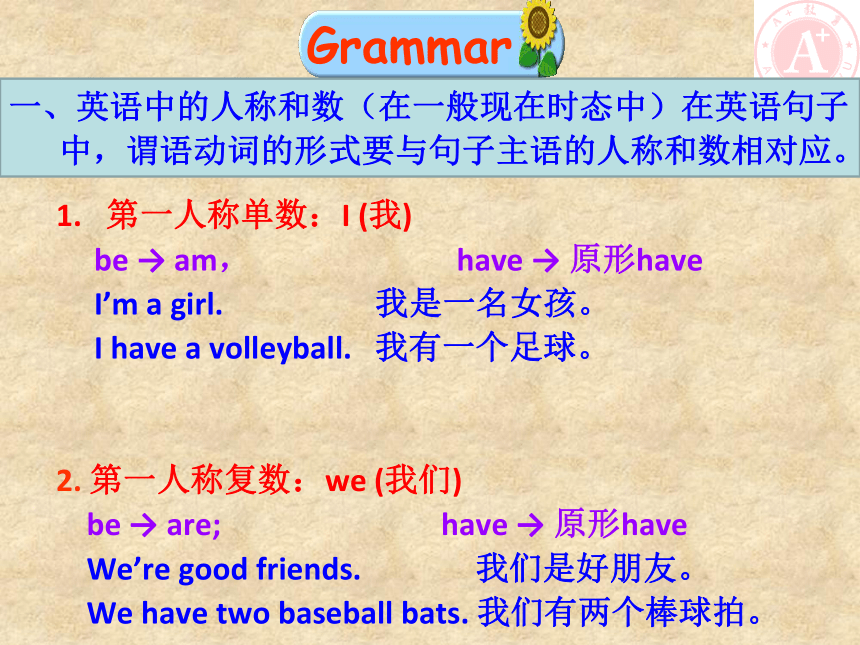
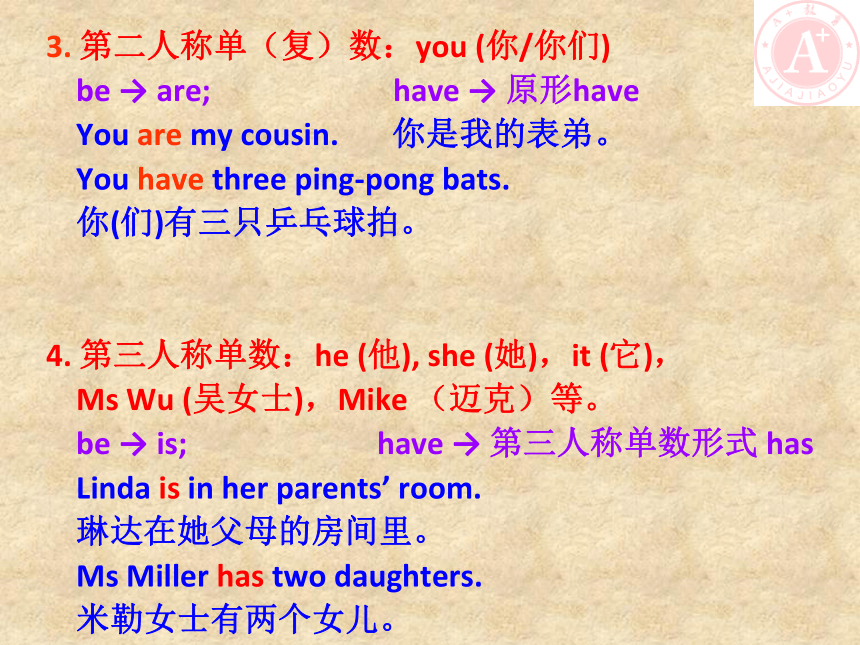

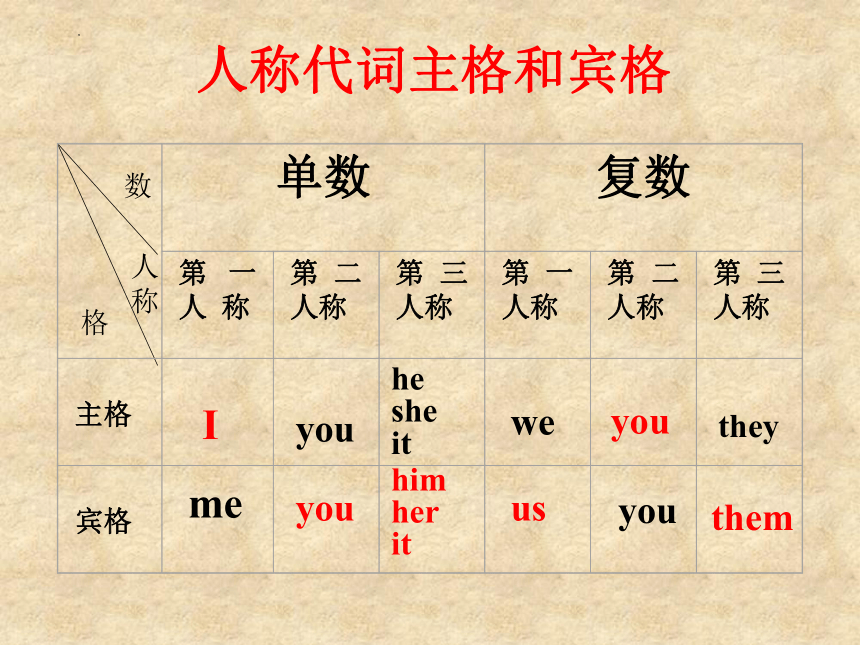
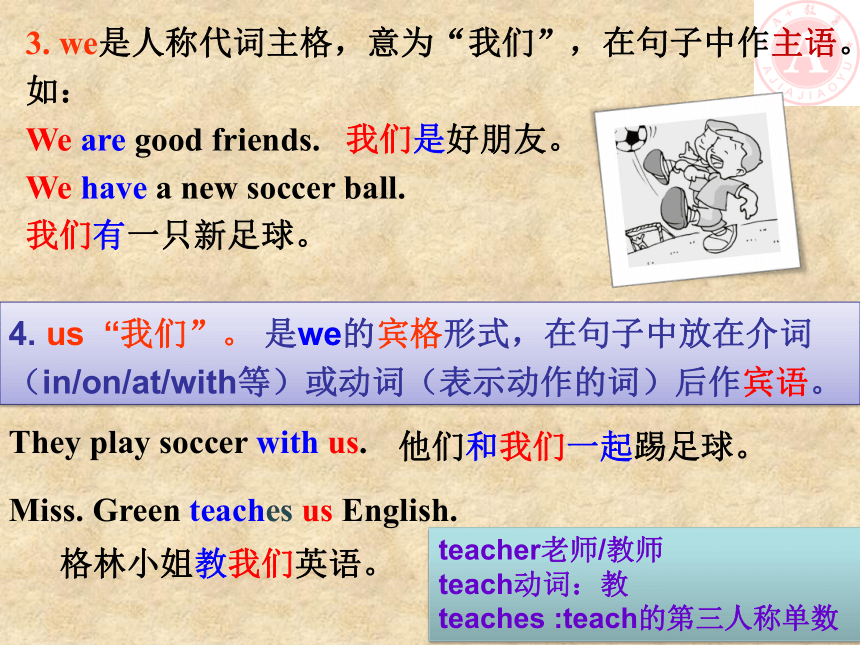
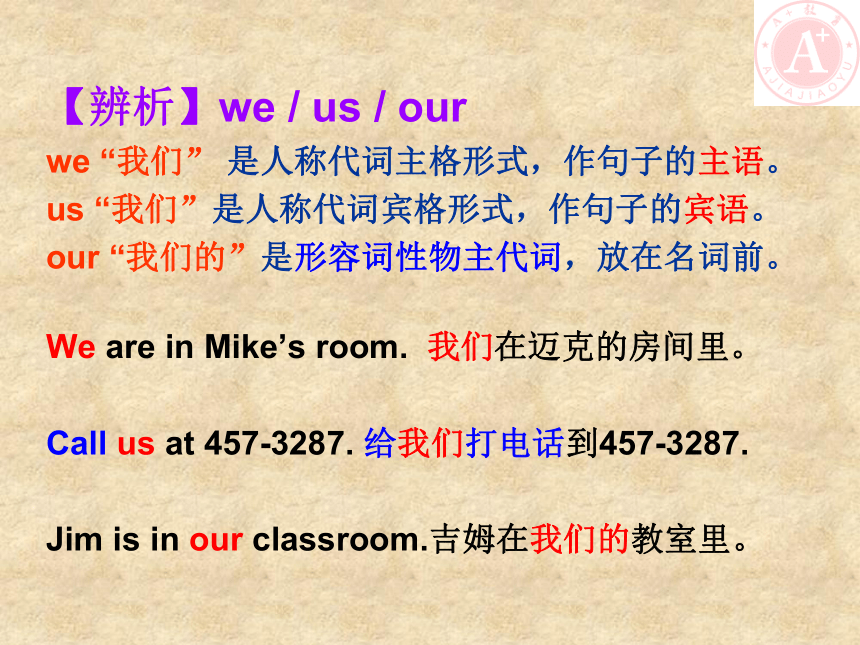
文档简介
(共15张PPT)
Unit 8
Do you have a soccer ball
第一人称单数:I (我)
be → am, have → 原形have
I’m a girl. 我是一名女孩。
I have a volleyball. 我有一个足球。
2. 第一人称复数:we (我们)
be → are; have → 原形have
We’re good friends. 我们是好朋友。
We have two baseball bats. 我们有两个棒球拍。
Grammar
一、英语中的人称和数(在一般现在时态中)在英语句子中,谓语动词的形式要与句子主语的人称和数相对应。
3. 第二人称单(复)数:you (你/你们)
be → are; have → 原形have
You are my cousin. 你是我的表弟。
You have three ping-pong bats.
你(们)有三只乒乓球拍。
4. 第三人称单数:he (他), she (她),it (它),
Ms Wu (吴女士),Mike (迈克)等。
be → is; have → 第三人称单数形式 has
Linda is in her parents’ room.
琳达在她父母的房间里。
Ms Miller has two daughters.
米勒女士有两个女儿。
第三人称复数:they (他们),Mike and Tom
(迈克和汤姆),his parents (他的父母亲),
two baseballs (两个棒球)等。
be → are; have → 原形have
Three basketballs are in the box.
在盒子里有三个篮球。
They have four volleyballs and two tennis balls.
他们有四个排球和二个网球。
人称代词主格和宾格
单数
复数
第一人 称
第二人称
第三人称
第一人称
第二人称
第三人称
主格
宾格
I
me
you
you
he
she
it
him
her
it
we
us
you
they
them
you
数
人称
格
3. we是人称代词主格,意为“我们”,在句子中作主语。如:
We are good friends. 我们是好朋友。
We have a new soccer ball.
我们有一只新足球。
4. us “我们”。 是we的宾格形式,在句子中放在介词(in/on/at/with等)或动词(表示动作的词)后作宾语。
They play soccer with us.
他们和我们一起踢足球。
Miss. Green teaches us English.
格林小姐教我们英语。
teacher老师/教师
teach动词:教
teaches :teach的第三人称单数
【辨析】we / us / our
we “我们” 是人称代词主格形式,作句子的主语。
us “我们”是人称代词宾格形式,作句子的宾语。
our “我们的”是形容词性物主代词,放在名词前。
We are in Mike’s room. 我们在迈克的房间里。
Call us at 457-3287. 给我们打电话到457-3287.
Jim is in our classroom.吉姆在我们的教室里。
人称代词they 和them
主格
练习:
1.他们是学生:________________
2. _______(她们) are listening to the radio.
3.There are some cats here , I like ______ (它们)
宾格
they
them
他们
她们
它们
They are students
They
them
1分钟热身小练
1. ________am a teacher.
2. My father gives_______(我) a soccer ball.
3. ______ are Chinese. (我们)
4.Her sister teaches_______(我们)Chinese.
5. _____ are a beautiful girl (你)
6. _____ are students (你们)
7. ___ is a cat.
8. ____ (他们) play tennis.
9. ______(他) always plays basketball after school
10. My dog likes _____. 我的狗喜欢她
I
me
We
us
You
You
It
They
He
her
I have a good friend. 我有一个好朋友。
She has a new pen. 她有一支新钢笔。
Explanation
have动词“有”,指某人拥有某物,表示所属关系。
常用句型:某人 + have/has + 某物,“某人拥有某物”。
当主语为第三人称单数形式时,用has的形式。
我们有3串钥匙。
我姐姐有2个书包。
We have three sets of keys.
My sister has two schoolbags.
2. late “迟到的” 是形容词,常用 be late 的结构。
Xiao Ming is always late.
小明总是迟到。
I am late for school.
我上学迟到了。
Come on ! We are late!
You are late .你迟到了。
My classmates are late for class .
我们班同学上课迟到了。
She/He/Mr.liu is late.
快点!我们迟到了!
其后的动词一定用动词原形(不作任何变化)。
Let me do it. 让我来做吧。
Let him play tennis. 让他打网球。
Let us find your books。让我们找你的书。
Let her play computer games with you.
让她和你一起玩电脑游戏。
以动词let开头的祈使句,表示向别人提建议,意思是“让……做……吧”。
结构:let +宾格+动词原形. “让某人做某事”
play basketball 意为“打篮球”,其中,play作
动词,意为“玩;娱乐;参加(运动或比赛);打;演奏”等。如:
play soccer 踢足球 play volleyball 打排球
play tennis 打网球 play ping-pong 打乒乓球
play baseball 打棒球 play games 玩游戏
Let’s play soccer after school.
放学后我们踢球吧。
They often play computer games.
他们总是玩游戏。
肯定回答:Yes, I do./ Yes, we do. / Yes, they do.
否定回答:No, I don’t /we don’t. /No, they don’t.
句型“Do you have… ” “表示你有…… 吗?”
用于询问物品的所属关系。是实义动词的一般疑问句结构。
它的回答是固定的:
主语是第一人称/第二人称/第三人称复数
句型结构为:Do + you/they/we/… + 动词原形 + …?
— Do they like basketball
— Yes, they do.
— No, they don’t.
— Do you have a notebook
— Yes, we do.
— No, we don’t.
— Does Jane have a new book
— Yes, she does.
— No, she doesn’t.
2. 当主语为第三人称单数时,
句子结构为: Does + he / she / it … + 动词原形 + …?
肯定回答:Yes, he does./Yes, she does./Yes, it does.
否定回答:No, he doesn’t./No, she doesn’t /No, it doesn’t.
— Does he like tennis
— Yes, he does.
— No, he doesn’t.
— Does Linda like English
— Yes, she does.
— No, she doesn’t.
Unit 8
Do you have a soccer ball
第一人称单数:I (我)
be → am, have → 原形have
I’m a girl. 我是一名女孩。
I have a volleyball. 我有一个足球。
2. 第一人称复数:we (我们)
be → are; have → 原形have
We’re good friends. 我们是好朋友。
We have two baseball bats. 我们有两个棒球拍。
Grammar
一、英语中的人称和数(在一般现在时态中)在英语句子中,谓语动词的形式要与句子主语的人称和数相对应。
3. 第二人称单(复)数:you (你/你们)
be → are; have → 原形have
You are my cousin. 你是我的表弟。
You have three ping-pong bats.
你(们)有三只乒乓球拍。
4. 第三人称单数:he (他), she (她),it (它),
Ms Wu (吴女士),Mike (迈克)等。
be → is; have → 第三人称单数形式 has
Linda is in her parents’ room.
琳达在她父母的房间里。
Ms Miller has two daughters.
米勒女士有两个女儿。
第三人称复数:they (他们),Mike and Tom
(迈克和汤姆),his parents (他的父母亲),
two baseballs (两个棒球)等。
be → are; have → 原形have
Three basketballs are in the box.
在盒子里有三个篮球。
They have four volleyballs and two tennis balls.
他们有四个排球和二个网球。
人称代词主格和宾格
单数
复数
第一人 称
第二人称
第三人称
第一人称
第二人称
第三人称
主格
宾格
I
me
you
you
he
she
it
him
her
it
we
us
you
they
them
you
数
人称
格
3. we是人称代词主格,意为“我们”,在句子中作主语。如:
We are good friends. 我们是好朋友。
We have a new soccer ball.
我们有一只新足球。
4. us “我们”。 是we的宾格形式,在句子中放在介词(in/on/at/with等)或动词(表示动作的词)后作宾语。
They play soccer with us.
他们和我们一起踢足球。
Miss. Green teaches us English.
格林小姐教我们英语。
teacher老师/教师
teach动词:教
teaches :teach的第三人称单数
【辨析】we / us / our
we “我们” 是人称代词主格形式,作句子的主语。
us “我们”是人称代词宾格形式,作句子的宾语。
our “我们的”是形容词性物主代词,放在名词前。
We are in Mike’s room. 我们在迈克的房间里。
Call us at 457-3287. 给我们打电话到457-3287.
Jim is in our classroom.吉姆在我们的教室里。
人称代词they 和them
主格
练习:
1.他们是学生:________________
2. _______(她们) are listening to the radio.
3.There are some cats here , I like ______ (它们)
宾格
they
them
他们
她们
它们
They are students
They
them
1分钟热身小练
1. ________am a teacher.
2. My father gives_______(我) a soccer ball.
3. ______ are Chinese. (我们)
4.Her sister teaches_______(我们)Chinese.
5. _____ are a beautiful girl (你)
6. _____ are students (你们)
7. ___ is a cat.
8. ____ (他们) play tennis.
9. ______(他) always plays basketball after school
10. My dog likes _____. 我的狗喜欢她
I
me
We
us
You
You
It
They
He
her
I have a good friend. 我有一个好朋友。
She has a new pen. 她有一支新钢笔。
Explanation
have动词“有”,指某人拥有某物,表示所属关系。
常用句型:某人 + have/has + 某物,“某人拥有某物”。
当主语为第三人称单数形式时,用has的形式。
我们有3串钥匙。
我姐姐有2个书包。
We have three sets of keys.
My sister has two schoolbags.
2. late “迟到的” 是形容词,常用 be late 的结构。
Xiao Ming is always late.
小明总是迟到。
I am late for school.
我上学迟到了。
Come on ! We are late!
You are late .你迟到了。
My classmates are late for class .
我们班同学上课迟到了。
She/He/Mr.liu is late.
快点!我们迟到了!
其后的动词一定用动词原形(不作任何变化)。
Let me do it. 让我来做吧。
Let him play tennis. 让他打网球。
Let us find your books。让我们找你的书。
Let her play computer games with you.
让她和你一起玩电脑游戏。
以动词let开头的祈使句,表示向别人提建议,意思是“让……做……吧”。
结构:let +宾格+动词原形. “让某人做某事”
play basketball 意为“打篮球”,其中,play作
动词,意为“玩;娱乐;参加(运动或比赛);打;演奏”等。如:
play soccer 踢足球 play volleyball 打排球
play tennis 打网球 play ping-pong 打乒乓球
play baseball 打棒球 play games 玩游戏
Let’s play soccer after school.
放学后我们踢球吧。
They often play computer games.
他们总是玩游戏。
肯定回答:Yes, I do./ Yes, we do. / Yes, they do.
否定回答:No, I don’t /we don’t. /No, they don’t.
句型“Do you have… ” “表示你有…… 吗?”
用于询问物品的所属关系。是实义动词的一般疑问句结构。
它的回答是固定的:
主语是第一人称/第二人称/第三人称复数
句型结构为:Do + you/they/we/… + 动词原形 + …?
— Do they like basketball
— Yes, they do.
— No, they don’t.
— Do you have a notebook
— Yes, we do.
— No, we don’t.
— Does Jane have a new book
— Yes, she does.
— No, she doesn’t.
2. 当主语为第三人称单数时,
句子结构为: Does + he / she / it … + 动词原形 + …?
肯定回答:Yes, he does./Yes, she does./Yes, it does.
否定回答:No, he doesn’t./No, she doesn’t /No, it doesn’t.
— Does he like tennis
— Yes, he does.
— No, he doesn’t.
— Does Linda like English
— Yes, she does.
— No, she doesn’t.
同课章节目录
- Unit 1 Good morning
- Section A
- Section B
- Unit 2 What's this in English?
- Section A
- Section B
- Unit 3 What color is it?
- Section A
- Section B
- Unit 4 My name's is Gina
- Section A
- Section B
- Unit 5 This is my siste
- Section A
- Section B
- Unit 6 Is this your pencil?
- Section A
- Section B
- Unit 7 Where's my schoolbag?
- Section A
- Section B
- Unit 8 Do you have a soccer ball?
- Sectioan A
- Sectioan B
- Unit 9 Do you like bananas?
- Section A
- Section B
- Unit 10 How much are these socks?
- Section A
- Section B
